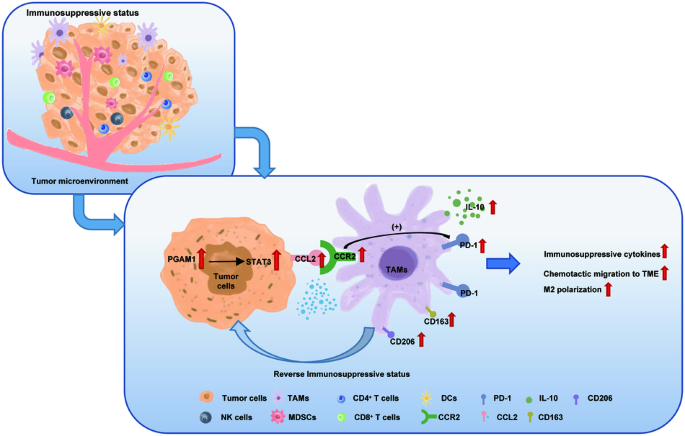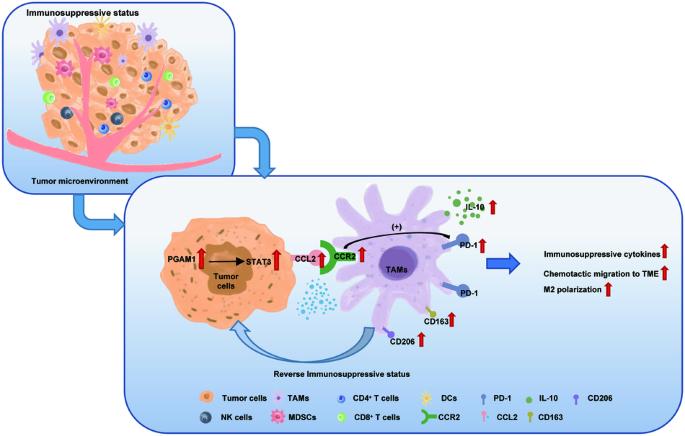Phosphoglycerate mutase 1 promotes breast cancer progression through inducing immunosuppressive M2 macrophages
IF 4.8
3区 医学
Q1 BIOTECHNOLOGY & APPLIED MICROBIOLOGY
引用次数: 0
Abstract
Immunosuppressive tumor microenvironment (TME) contributes to tumor progression and causes major obstacles for cancer therapy. Phosphoglycerate mutase 1 (PGAM1) is a key enzyme involved in cancer metabolism while its role in remodeling TME remains unclear. In this study, we reported that PGAM1 suppression in breast cancer (BC) cells led to a decrease in M2 polarization, migration, and interleukin-10 (IL-10) production of macrophages. PGAM1 regulation on CCL2 expression was essential to macrophage recruitment, which further mediated by activating JAK-STAT pathway. Additionally, the CCL2/CCR2 axis was observed to participate in PGAM1-mediated immunosuppression via regulating PD-1 expression in macrophages. Combined targeting of PGAM1 and the CCL2/CCR2 axis led to a reduction in tumor growth in vivo. Furthermore, clinical validation in BC tissues indicated a positive correlation between PGAM1, CCL2 and macrophage infiltration. Our study provides novel insights into the induction of immunosuppressive TME by PGAM1 and propose a new strategy for combination therapies targeting PGAM1 and macrophages in BC.


磷酸甘油酸突变酶 1 通过诱导免疫抑制性 M2 巨噬细胞促进乳腺癌的进展。
免疫抑制性肿瘤微环境(TME)会导致肿瘤进展,并对癌症治疗造成重大障碍。磷酸甘油酸突变酶1(PGAM1)是一种参与癌症代谢的关键酶,但它在重塑肿瘤微环境中的作用仍不清楚。在这项研究中,我们发现抑制乳腺癌(BC)细胞中的 PGAM1 会导致巨噬细胞的 M2 极化、迁移和白细胞介素-10(IL-10)产生减少。PGAM1 对 CCL2 表达的调控是巨噬细胞募集的关键,而巨噬细胞募集又是通过激活 JAK-STAT 通路进一步介导的。此外,还观察到 CCL2/CCR2 轴通过调节巨噬细胞中 PD-1 的表达参与了 PGAM1 介导的免疫抑制。联合靶向 PGAM1 和 CCL2/CCR2 轴可减少体内肿瘤的生长。此外,对 BC 组织的临床验证表明,PGAM1、CCL2 和巨噬细胞浸润之间存在正相关。我们的研究为PGAM1诱导免疫抑制性TME提供了新的见解,并为针对PGAM1和巨噬细胞的BC联合疗法提出了新的策略。
本文章由计算机程序翻译,如有差异,请以英文原文为准。
求助全文
约1分钟内获得全文
求助全文
来源期刊

Cancer gene therapy
医学-生物工程与应用微生物
CiteScore
10.20
自引率
0.00%
发文量
150
审稿时长
4-8 weeks
期刊介绍:
Cancer Gene Therapy is the essential gene and cellular therapy resource for cancer researchers and clinicians, keeping readers up to date with the latest developments in gene and cellular therapies for cancer. The journal publishes original laboratory and clinical research papers, case reports and review articles. Publication topics include RNAi approaches, drug resistance, hematopoietic progenitor cell gene transfer, cancer stem cells, cellular therapies, homologous recombination, ribozyme technology, antisense technology, tumor immunotherapy and tumor suppressors, translational research, cancer therapy, gene delivery systems (viral and non-viral), anti-gene therapy (antisense, siRNA & ribozymes), apoptosis; mechanisms and therapies, vaccine development, immunology and immunotherapy, DNA synthesis and repair.
Cancer Gene Therapy publishes the results of laboratory investigations, preclinical studies, and clinical trials in the field of gene transfer/gene therapy and cellular therapies as applied to cancer research. Types of articles published include original research articles; case reports; brief communications; review articles in the main fields of drug resistance/sensitivity, gene therapy, cellular therapy, tumor suppressor and anti-oncogene therapy, cytokine/tumor immunotherapy, etc.; industry perspectives; and letters to the editor.
 求助内容:
求助内容: 应助结果提醒方式:
应助结果提醒方式:


